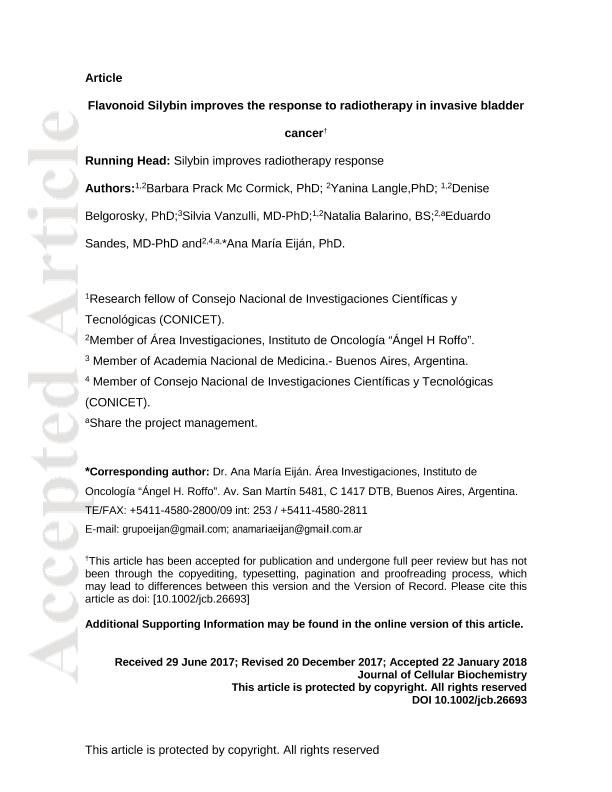Artículo
Flavonoid silybin improves the response to radiotherapy in invasive bladder cancer
Prack Mc Cormick, Bárbara Patricia ; Langle, Yanina Verónica
; Langle, Yanina Verónica ; Belgorosky, Denise
; Belgorosky, Denise ; Vanzulli, Silvia; Balarino, Natalia Patricia
; Vanzulli, Silvia; Balarino, Natalia Patricia ; Sandes, Eduardo Omar; Eijan, Ana Maria
; Sandes, Eduardo Omar; Eijan, Ana Maria
 ; Langle, Yanina Verónica
; Langle, Yanina Verónica ; Belgorosky, Denise
; Belgorosky, Denise ; Vanzulli, Silvia; Balarino, Natalia Patricia
; Vanzulli, Silvia; Balarino, Natalia Patricia ; Sandes, Eduardo Omar; Eijan, Ana Maria
; Sandes, Eduardo Omar; Eijan, Ana Maria
Fecha de publicación:
01/2018
Editorial:
Wiley-liss, Div John Wiley & Sons Inc
Revista:
Journal of Cellular Biochemistry
ISSN:
0730-2312
Idioma:
Inglés
Tipo de recurso:
Artículo publicado
Clasificación temática:
Resumen
Conservative treatment for invasive bladder cancer (BC) involves a complete transurethral tumor resection combined with chemotherapy (CT) and radiotherapy (RT). The major obstacles of chemo-radiotherapy are the addition of the toxicities of RT and CT, and the recurrence due to RT and CT resistances. The flavonoid Silybin (Sb) inhibits pathways involved in cell survival and resistance mechanisms, therefore the purpose of this paper was to study in vitro and in vivo, the ability of Sb to improve the response to RT, in two murine BC cell lines, with different levels of invasiveness, placing emphasis on radio-sensitivity, and pathways involved in radio-resistance and survival. In vitro, Sb radio-sensitized murine invasive cells through the inhibition of RT-induced NF-κB and PI3K pathways, and the increase of oxidative stress, while non-invasive cells did not show to be sensitized. In vivo, Sb improved RT-response and overall survival in invasive murine tumors. As Sb is already being tested in clinical trials for other urological cancers and it improves RT-response in invasive BC, these results could have translational relevance, supporting further research.
Palabras clave:
BLADDER CANCER
,
BLADDER PRESERVATION
,
SILYBIN
,
RADIOTHERAPY
,
RADIOSENSITIZER
Archivos asociados
Licencia
Identificadores
Colecciones
Articulos(OCA HOUSSAY)
Articulos de OFICINA DE COORDINACION ADMINISTRATIVA HOUSSAY
Articulos de OFICINA DE COORDINACION ADMINISTRATIVA HOUSSAY
Articulos(SEDE CENTRAL)
Articulos de SEDE CENTRAL
Articulos de SEDE CENTRAL
Citación
Prack Mc Cormick, Bárbara Patricia; Langle, Yanina Verónica; Belgorosky, Denise; Vanzulli, Silvia; Balarino, Natalia Patricia; et al.; Flavonoid silybin improves the response to radiotherapy in invasive bladder cancer; Wiley-liss, Div John Wiley & Sons Inc; Journal of Cellular Biochemistry; 119; 7; 1-2018; 5402-5412
Compartir
Altmétricas



